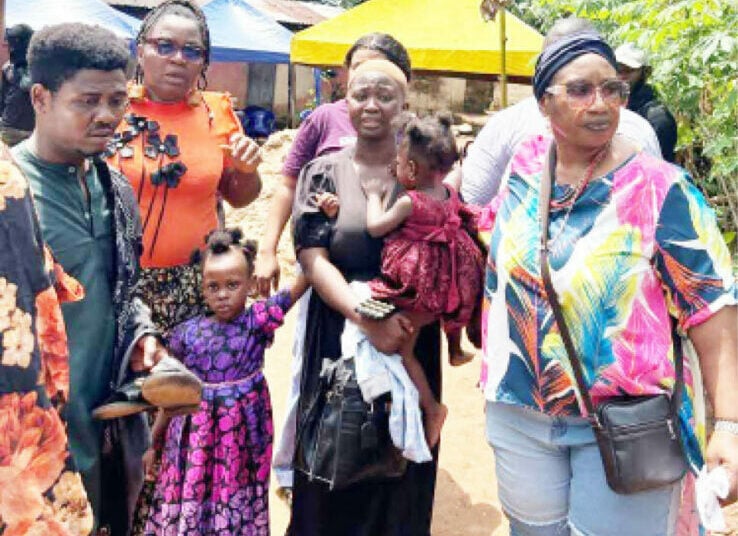When Mrs Chika Ndubuisi Odinakachi lost her husband, she thought the worst was over. But barely hours after his burial preparations began, the grieving widow found herself facing a second more terrifying ordeal , an age-old ritual meant to prove her “innocence” in his death. According to community sources, her in-laws insisted she must drink the water used to wash her husband’s corpse, a practice they claimed would cleanse her of any suspicion.
As the story broke online, voices of outrage drowned the silence of rural Imo, forcing a national reckoning on the cruel traditions that continue to haunt widows in the name of culture.
For widow- Mrs. Odinakachi, the days ahead may stretch painfully long as she and her two children come to terms with the sudden loss of her husband, Mr. Ndubuisi Odinakachi Akamegbulem. Until his death, the late Ndubuisi lived in Umuahia, Abia State, where he worked and raised his young family in quiet modesty. Their lives took a tragic turn when he was diagnosed with hepatitis , a condition that was reportedly mismanaged, leading to his untimely death. What should have been a period of mourning soon spiraled into fear and public humiliation, as cultural expectations and suspicion from in-laws turned Odinakachi’s grief into yet another ordeal.
Before his death, Ndubuisi Odinakachi Akamegbulem was a man carving a decent life for himself and his young family. Once based in Lagos, he later relocated to Umuahia, Abia State, seeking a quieter environment to raise his wife and two children.
Friends described him as hardworking, cheerful, and determined , a man who had known his share of struggles yet faced them with quiet strength. Years earlier, he had survived a motor accident that required blood transfusion, during which he reportedly contracted hepatitis. Despite managing the illness and maintaining a modest but comfortable life, a misdiagnosis and poor medical management would later claim his life , a loss that shattered his family and set in motion a chain of events more painful than grief itself.
However, for reasons best known to Ndubuisi and his wife, the family had kept their distance from home. They neither visited for holidays nor attended family gatherings or burials. Sources in the community told LEADERSHIP Weekend that Ndubuisi had not set foot in his hometown for nearly 15 years. It was also gathered that although both of his parents had died when he and his siblings were still young, the traditional burial rites expected of them under Igbo custom had reportedly not been completed. To many in the extended family, this long absence , coupled with unperformed rites was seen as a break from ancestral obligation, one that would later cast a shadow over his death and the treatment of his widow.
The Akamegbulem family, according to community sources, consisted of two sons and a daughter , with another daughter said to have been born into another family. Tragedy, however, seemed to shadow their lineage. The eldest son reportedly went missing more than thirty years ago, vanishing without a trace and never to be heard from again. His disappearance, locals said, left deep scars on the family and instilled a lingering fear in Ndubuisi and his surviving sister. Those close to them believed that this sense of loss and uncertainty partly explained Ndubuisi’s long absence from his ancestral home and his reluctance to reconnect with his extended family.
According to family sources, Ndubuisi’s only surviving sister, a trader based in Onitsha, had repeatedly urged him to return home so they could perform the long-overdue burial rites of their parents and perhaps find closure for their missing brother. She reminded him that he was now financially stable and capable of fulfilling those obligations. But he reportedly declined each time. A family source, who pleaded anonymity, told LEADERSHIP Weekend that Ndubuisi’s persistent refusal soon bred resentment. “His sister began to suspect that his wife, Chika, was the one discouraging him from coming home,” the source said, hinting at a growing rift that would later erupt after his death.
It was widely believed that his relatives blamed him for abandoning them and for spending his earnings on his in-laws, a development that deeply angered them.
What they perhaps didn’t know was that he was struggling with health issues and was trying to get treatment within his means. He was reportedly moving from hospital to hospital in search of a permanent cure.
When his sister learned of his illness, she took him to a herbalist, believing that his condition was the result of a spiritual attack linked to their parents’ incomplete burial rites. Unfortunately, by the time he received care, the hepatitis had already severely damaged his body. Despite the money and effort spent on various treatments, he ultimately passed away, a tragic reminder of how deeply cultural beliefs and medical realities can intersect.
“Further, her late husband, Ndubuisi had not returned to the village for almost 15 years of sojourn and refused to, despite several appeals from his sister that he should return home for them to do the burial rites of their late parents especially since he could afford it.” The source said.
Part of the annoyance was that while Ndubuisi had refused to have dealings with people from his Isieke community, Awommama in Oru East local government area of Imo State, his mother inlaw and her son were living with them in Umuahia, a development his sister couldn’t understand.
What Really Happened?
But as reporters and rights advocates soon discovered, the story was far more complicated than the viral posts suggested. When LEADERSHIP Weekend visited the community, residents painted conflicting pictures, some insisting the widow had indeed been pressured into the ritual, others claiming it was a false alarm amplified by social media. Local leaders admitted that widowhood rites once formed part of the community’s mourning customs, but denied that anyone was forced to drink “corpse water” in this case.
Police sources confirmed that they had intervened after the story broke online, taking statements from both the widow and her in-laws.
“We received the report and immediately began an investigation. So far, no evidence supports the claim that she was made to drink the bath water”, one officer said.
Imo State Government Involvement
Already, Governor Hope Uzodimma of Imo State has ordered an investigation to unmask the people who sought to reintroduce harmful widowhood practices in the state.
Social media handles had alleged that Odinakachi Ndubuisi’s widow, Chika was been forced to drink the water used to wash the corpse to prove her innocence over his death, a development that triggered panic.
The governor was alerted by the barrage of reports and immediately directed the State commissioner for Women Affairs, Lady Nkechi Ugwu to head to the burial for on the spot assessment.
Ugwu, alongside the Oru East local government chairman, Onurube Coalition Group, Virgin Heart Foundation, Harsco Global Media, Odumodu TV, and Sisters With a Goal stormed the community, and met the burial of Ndubuisi going on well.
Ugwu had stormed the community with security operatives after news reports that Chika falsely accused by her in-laws, the Akamegbulem family, of killing him.
The Imo State commissioner for Women Affairs, Chief Nkechi Ugwu said the ministry waded into the obnoxious, victimization and ill-human treatment meted against a widow in Awo-Omamma in Oru-East LGA whose husband died of a protracted sickness.
Ugwu said “when the attention of the ministry was drawn that the family members accused her of killing her husband and wanted the widow to drink the water used in bathing the husband’s corpse and also bathe with the water, efforts were made to stop the obnoxious and harmful traditional practice.
“In collaboration with the council Chairman of Oru East, Chief Okwaraigwe, the representatives of Virgin Heart Foundation and Onurube, director Child Development of the Ministry, Mrs. Blessing Azubuike, and security personnel from Oru East, we attended the burial to ensure that obnoxious practice was not carried out on the widow.
Further, she said calm has been restored to the community saying “calm has been restored to the community with investigation started to fish out those behind the harmful traditional practice long abrogated and prohibited. We gave a stern warning to people to desist from such act because in imo state, such will not be condoned”.
Meanwhile, calm has been restored to the community while Chika and her children have been taken into protective custody to protect them from perceived provocations from her inlaws.
Onurube Coalition Intervention :
Coordinator of Onurube Coalition, Marjorie Ezihe, the group that roused the Imo State commissioner for Women Affairs, Lady Nkechi Ugwu and other stakeholders to the community, told our correspondent that before the burial, there was some bad blood between Chika and Ndubuisi’s sister.
The bereaved sister believed that Ndubuisi’s refusal to conduct the proper burial of their late parents was the reason behind the repeated accidents, and none response to treatment for the hepatitis. She was alleged to have always called to request that the traditional rites be done lest the gods strike the family but was always rebuffed by her brother in Umuahia then, Ezihe said.
She said “the siblings were orphaned quite early. They also have a brother that went missing for over 30 years till date. The bereaved sister just believed that it was as a result of none completion of their late parents burial rites and that of the missing eldest child. So she was said to always call Ndubuisi to return home for them to do it because he was quite comfortable.
“I think she was particularly scared because Ndubuisi had been involved in motor accidents and during one, he was transfused blood from when he developed hepatitis that finally led to his death.
“However, when we arrived the community to confirm the allegation shared via social media, we met the place calm, nobody was maltreating Chika and up to this moment, she is yet to show us the person who threatened to force her to drink the water used to wash her husband’s corpse.
“What I discovered was that due to the anxiety over Ndubuisi’s death and the associated beliefs around none completion of his parents burial rites, the widow, her mother, and her brother were genuinely scared that they may be dealt with by the married women of the community as well as the Umuadas and so panicked”, Ezihe said.
Isieke Community Today
A source in the village said, a thoroughly scared Chika, who had no friends in the community nor who to confide in, alerted an Aunty based in Lagos. It was the Aunt who appealed to bloggers to run with the report, which in turn triggered panic and attention.
Unfortunately, following the alleged alarm to an Aunty in Lagos by Chika, the Isieke community has been thrown into turmoil, already 16 people have been arrested and released after the Vigilante group allegedly extorted N200,000 from them.
Already, the Isieke people are pressing that Chika names the person(s) who threatened that she had to drink the water used in washing late Ndubuisi’s corpse even as she maintained that she can’t identify them.
This is because would be daughter in-laws have started calling off their planned marriage to men from the community to avoid the none existent practice.
While wives already married into the community are demanding answers to the development and how it started.
Understanding Umuada And Umundom Activity During Burials :
Udochukwu Chukwu, the convener of office of the citizen said in Igbo land, the Umuadas and the married women of a community were known to make demands as burial rites for their group.
Chukwu said “when there are allegations against a widow by the mother or inlaws, the Umuadas and Umundom (married women into the community) can perpetrate widowhood practices which is basically verbal attacks on the widow for being wicked.
“The Umuadas will make outrageous demands around food but since they consist of relatives, the siblings of the bereaved find a way to appease them. They can demand for probably 100 loaves of choice bread but then the bereaved family tries to negotiate to what they can afford.
“Decades ago, some of them may decide to drop palm fronts in the compound of the bereaved which is considered a taboo. So to avoid it, the bereaved family keeps negotiating until they arrive at a compromise suitable for both parties. But I can assure you that I have not seen anywhere that the Umuadas or the Umundom stopped a burial from taking place.
“Umuada say they are mourning their person. The target is actually self centered, it’s from siblings not the widow. But where circumstances like accusations exist, they use them to verbally abuse the person.
Because you can’t beat them due to old age, so they just forment trouble and get away with it.
“These days, we have more educated women from every community and these set of people intervene and tell the older women to be realistic and accept what has been offered compared to what we saw in the 80s and 90s. That allegation simply made a mess of all the efforts of civil society organisations and the churches to eradicate harmful widowhood practices in Imo State and other places.
“You know in Igbo land, the women are cherished as they are either our sisters or wives. So no matter the drama they put up, the bereaved family just endures it because they also include very old aunties but it doesn’t involve those harmful widowhood practices anymore”, Udochukwu Chukwu stated.
Current Situation :
On her part, Ndubuisi’s sister is sad and grieving that weighty allegations were made and their community now portrayed in bad light. While she was summarily considered the suspect.
Currently, Ndubuisi’s sister and his wife, Chika have switched off their phones over the barrage of calls and messages from family and friends over the incident.
The community is still waiting for Chika to name the people who threatened her with the allegation so they can clear from the negative reports about burials.
The people arrested during the burial have all been released while they await the outcome of the investigation ordered by Governor Hope Uzodimma.
But one thing is obvious, the Akamegbulem family needs loads of patience to settle the mistrust and misgivings that have creeped into their family over the report. It behoves on the community and government to help restore the family which has been rattled by unfounded reports.
Still, the controversy left deep questions lingering , about how easily old customs resurface under the weight of grief, and how quickly digital outrage can turn whispers into national headlines.
Beyond the disputed details of one woman’s ordeal lies a broader truth: across parts of Nigeria, widows continue to face humiliation and harmful practices disguised as tradition. From forced hair-shaving to seclusion, to being accused of killing their husbands, many endure silent suffering in communities where culture and patriarchy still collide.





